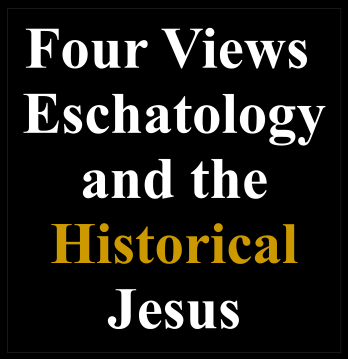First Edition

Precise Discussions Can Help
Christians Successfully Isolate, Identify,
and Resolve Impasses Around
Problematic Interpretations
by Mark Mountjoy
Introductory Remarks
Early in the twentieth century, Albert Sweitzer, 14 January 1875 – 4 September 1965. In 1905 he embarked upon an ambitious project, a groundbreaking book he wrote: The Quest of the Historical Jesus," It is a 1906 work of Biblical historical criticism written by Albert Schweitzer during the previous year, before he began to study for a medical degree."1
Sweitzer, Sweitzer, Sweitzer. Sweitzer, Sweitzer, Sweitzer. He, he, he. He. He. He. When we look at what Jesus said in Matthew, in Mark, in Luke, and in John, what do we see? What do we hear him saying? When we concern ourselves with specific categories, about certain familiar motifs, certain familiar themes--on 'this generation,' on the coming of the Son of man, on Jerusalem, on the destruction of the Second Temple, on the abomination of desolation, on the kingdom of God and the children of the kingdom, on the resurrection of the dead, on the fulfillment of all things--what result do we get and what collateral evidence do we see take shape to tell us more than we previously supposed about the message and ministry of Jesus? Who is the historical Jesus, and what is the faith that was once and for all time delivered unto the saints?
1 This generation texts.
2 Son of man in the clouds prophecies.
3. On Satan in the Gospel biographies. The ask, how does what Jesus said about the Wicked Spirit in Matthew 12:43-45 effect our interpretation about the events forecast in Revelation 20:7-15?
4. Indictment of Public Enemy Number One and DIVORCE of first-century Jerusalem. What is Matthew 23:29-39 saying to us about the culpability of the holy city? Is this to be calculated as a single subject in conjunction with Luke 9:31 and Luke 11:45-51? How does this impact our understanding of such texts as Revelation 18:20-24 and Revelation 19:1-4?
5. How does the abomination of desolation, in Matthew 24:15 and Mark 13:14 dovetail with the destruction of the Second Temple and what does that knowledge do to our awareness of the probabilities entertained by the Apostle Paul, in 2 Thessalonians 2:1-12 change or improve?
6. How does what Jesus said about the resurrection of the dead in in in in in in in and in affect our understanding about the placement and timing of Daniel 7:20s tribunal and the events foreseen in Daniel 12:1-12?
7. The destruction of the Second Temple as the deadline outlined in Daniel 9 and strongly inferred in the Olivet Discourse...or NOT. Can we have it both ways??
8. What Jesus expected: Matthew 10:23; 16:27-28, Matthew 24:29-34; 26:63, and John 21:21.
9. All things written to be fulfilled in the destructions and desolations of Jerusalem. Luke 21.
10. Matthew 18 outlines offenses and church discipline. Does this include offense against Jesus's own apocalyptic perspectives that are clearly spelled out and the subject of our present discussion? (The use and misuse of disciplinary texts come in here).
11. Children of the kingdom to be cast into outer darkness - Matthew 8, Luke, Matthew 21. Luke 13.
12. Prophecies of the 4 views are not prophecies of Jesus or the New Testament. The creeds of the conventional Christian church DO NOT reflect the teachings of Jesus, the Apostles, or the Scribes of the Holy Scriptures. No first or second-century Christian believed the four views.
Conclusion
We have a bird's eye view, an overview, a complete and comprehensive picture, something we all can work with; something we can each observe, without pressure or coercion, and something we can come together, as Christians, and talk about on meek and civil terms. What do we change? What do we adjust? What do we revise and what do we eliminate? Only by taking everything into account and only by having a more or less even view of the narrative can we come closer to what could be called a more accurate grasp of the historical Jesus.
Showcase charts. Use N/C to mean No Comment. Use R to mean reaching.
Endnotes
1 https://en.wikipedia.org/wiki/The_Quest_of_the_Historical_Jesus.
